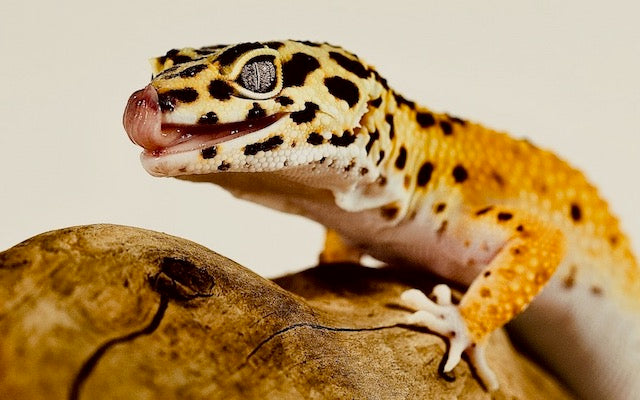Many new leopard gecko keepers understandably want to give their little leo the occasional treat. Maybe you’re tired of treating your leopard gecko to hornworms and superworms and you want to shake things up a bit. Knowing that many gecko species are frugivorous omnivores, you might think it’s ok to toss in an apple slice. You want to know, what—if anything—your leopard gecko can eat besides insects?
What Can Your Leopard Gecko Eat Besides Insects?
Leopard geckos are insectivores and, therefore, ought not to be fed anything besides insects. That's the short answer.
Here’s why you should not feed your leopard gecko anything other than insects.
Can Leopard Geckos Eat Fruits or Vegetables?
No. Leopard geckos can’t eat fruits or vegetables.
Leopard geckos have very short, highly alkaline digestive tracts. While their digestive system is uniquely suited to an insectivorous diet, it is not suited for digesting fruits or vegetables. It takes a longer and more acidic digestive system to break down the cellulose contained in fruits and vegetables.
Leopard geckos also lack a cecum. The cecum is a small pouch at the beginning of the large intestine that contains the beneficial bacteria and enzymes herbivores and omnivores need to break down and absorb essential nutrients from things like fruits and vegetables.
Pro Tip: The only time your leopard gecko should be offered fruit is when your vet recommends a pureed banana-and-insect smoothie as part of treatment for a sick leo. Never offer your leopard gecko vegetables.
Can Leopard Geckos Eat Meat?
No. Leopard geckos can’t eat meat.
In general, you shouldn’t offer human foods to your leo. This is just as true of any sort of meat as it is of fruits and vegetables.
Meats like beef, pork, and chicken are too high in protein for your leopard gecko’s digestive system. Some meats also contain too much fat, and feeding them to your leo will put it at risk of obesity.
Other risks include:
- Salmonella
- Parasites
- Choking
- Digestive issues
Raw meats are especially risky. Raw chicken and fish are known to carry salmonella and/or parasites. Pork has also been known to carry parasites.
The only meat that you could consider offering to your leopard gecko is the occasional pinky mouse. Be aware, however, that even pinky mice pose certain risks, and not all leopard geckos will eat them.
Pro Tip: It’s best to not offer your leopard gecko any sort of meat.
What Do Leopard Geckos Eat?
Leopard geckos are insectivores, not omnivores. Their digestive systems are specifically designed to digest insect matter, and can’t process plant matter, vegetables, fruit, meat, fish, or any other type of food.
When feeding your leopard gecko, it’s best to focus on highly-nutritious, gut-loaded, calcium-dusted insects like:
- Dubia roaches
- Crickets
- Locusts/grasshoppers
- Mealworms
If you want to offer your leopard gecko an occasional treat, you can offer it:
- Superworms
- Hornworms
- Waxworms
- Butterworms
- Silkworms
As with their staple insects, the occasional treats you offer your leopard gecko ought to be dusted in your preferred Calcium/Vitamin D3 supplement.

Are All Geckos Insectivores?
Not all geckos are insectivores.
As a matter of fact, the gecko family is a very large and diverse species of lizard. There are over 1,850 known species divided up into six families:
- Carphodactylidae
- Diplodactylidae
- Eublepharidae
- Gekkonidae
- Phyllodactylidae
- Sphaerodactylidae
Of those 1,850 species, some of the most popular pet species are frugivorous omnivores – meaning that they eat insects, fruits, and nectar. These include the:
- Crested Gecko
- Chahoua Gecko
- Giant Day Gecko
- Gargoyle Gecko
- Gold Dust Day Gecko
- Leachie Gecko
- Yellow-Headed Day Gecko
In addition to the frugivorous omnivores, there are many popular insectivorous gecko species that are kept as pets. These include the:
- African Fat-Tailed Gecko
- Chinese Cave Gecko
- Common House Gecko
- Flying Gecko
- Frog-Eyed Gecko
- Leopard Gecko
- Madagascar Ground Gecko
- Mediterranean House Gecko
If you’re looking for a gecko that can eat something other than just bugs, then you might want to look into some of the popular frugivorous omnivores, like the crested gecko or the gargoyle gecko. But if you can’t resist the cuteness of the leopard gecko, then always be aware that your leo should only eat insects.
Takeaway: Leopard geckos' digestive systems are uniquely suited to digesting insects. For this reason, you should not offer it foods other than gut-loaded Dubia roaches, crickets, grasshoppers, mealworms, and other leo-friendly insects.
Knowing your leopard gecko should only eat insects, you need to find a good source of live insects – like Dubia roaches. Dragon’s Diet offers humanely raised Dubia roaches that are gut-loaded with highly nutritious foods immediately prior to shipping. Our Dubia roaches are also backed by our live delivery guarantee. Shop Dubia roaches today!








